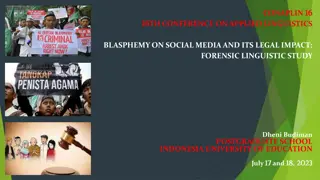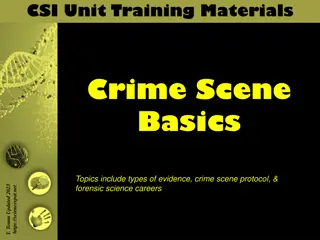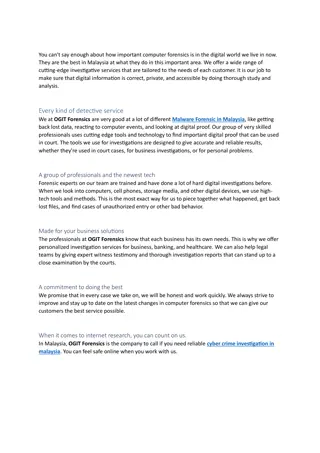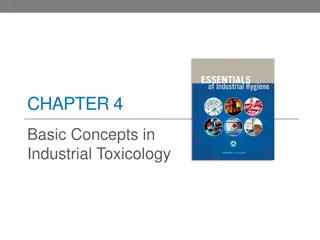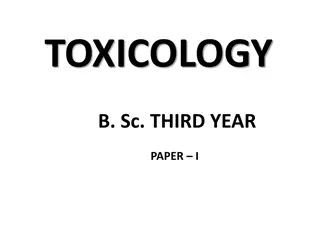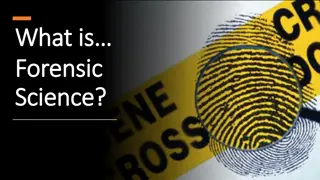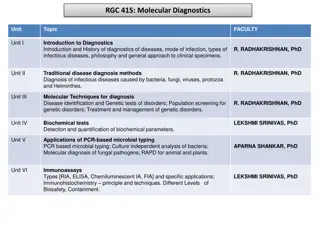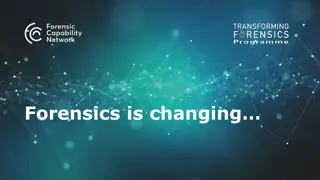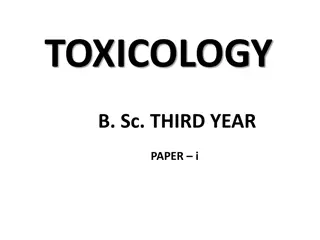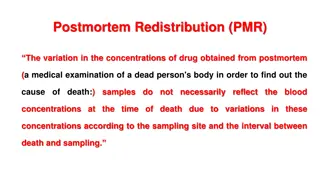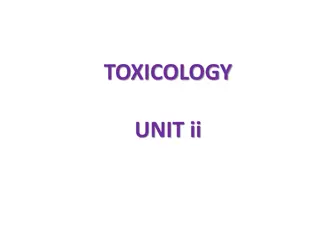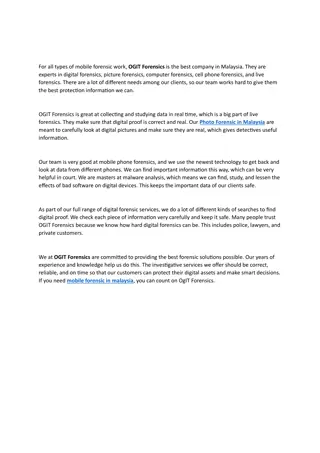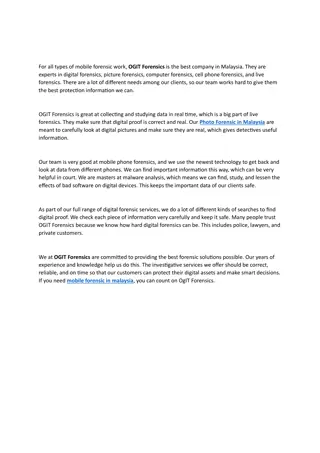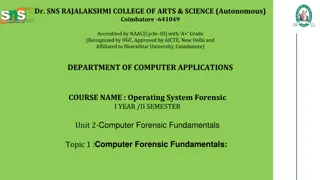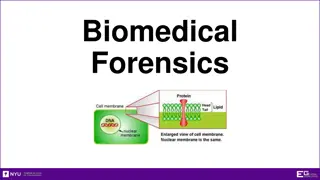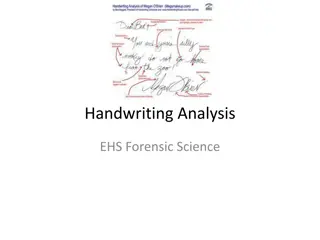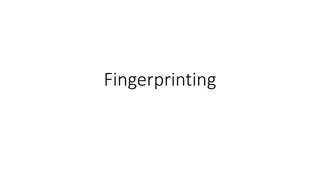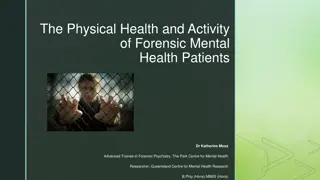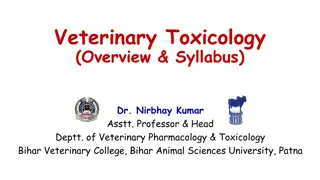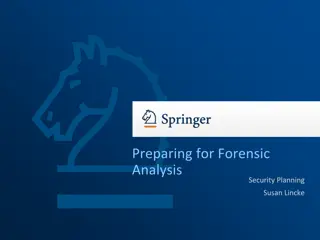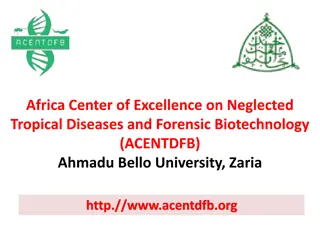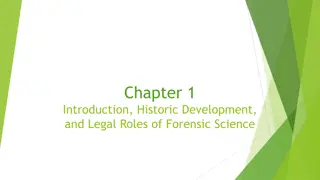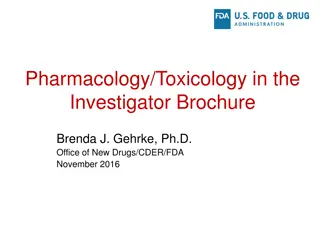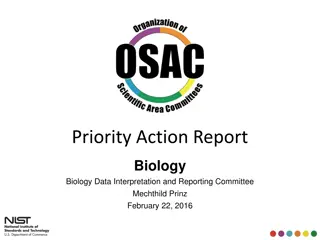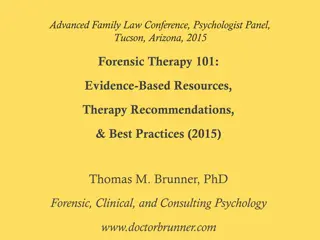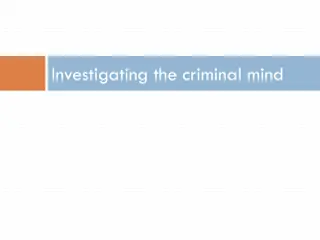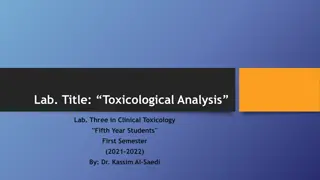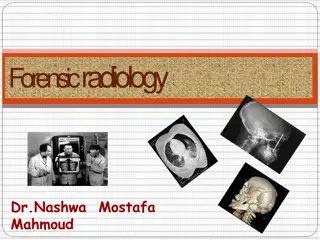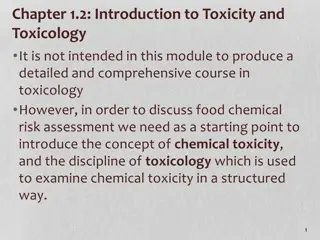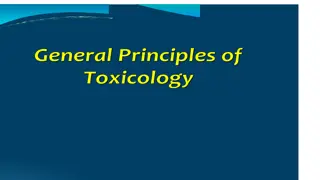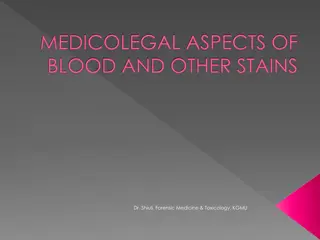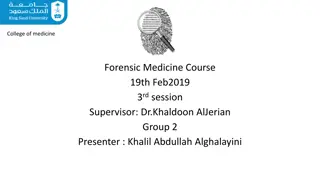Analysis of Explosive Impact in Forensic Science
Explore the assessment of explosive impact, friction, and shock cufs in forensic science. Delve into post-blast investigations and their significance. Presentation on Feb 09, 2023, at School of Forensic Sciences, Bhubaneshwar Campus.
2 views • 24 slides
Impact of Blasphemy on Social Media: Forensic Linguistic Analysis
Language plays a crucial role in human communication, especially on social media platforms where public speech can have legal consequences. This research delves into the concept of blasphemy on social media and its legal implications, focusing on linguistic forensic study. It explores how language c
7 views • 24 slides
Crime Scene Basics and Forensic Science Careers
Explore the fundamentals of crime scene investigation, including types of evidence, protocols, and careers in forensic science. Learn about key vocabulary, CSI personnel roles, and CSI protocols for documenting and examining crime scenes. Delve into the realm of forensic science careers, from crimin
6 views • 9 slides
Malware Forensic in Malaysia
OGIT Forensics, a leading Cyber Crime Forensic service in Malaysia, specializes in social networking analysis, security intelligence, mobile phone forensic, computer forensic, and audio-video forensic services. Our adept team conducts in-depth digital investigations, delivering accurate and efficien
1 views • 1 slides
Basic Concepts in Industrial Toxicology
Industrial toxicology is a vital field that studies the effects of various agents on organism health through mechanisms of action, toxicokinetics, and more. It explores toxic chemical absorption, distribution, metabolism, and elimination, as well as toxic effects on major organ systems. Learn about
0 views • 35 slides
Toxicology
The study of toxicology involves understanding dose-response relationships, lethal concentrations, tolerance limits, toxicity curves, and factors influencing toxicity. Dose, response, acute toxicity, chronic toxicity, LD50, and ED50 are key concepts in toxicology that help assess the effects of chem
3 views • 24 slides
Forensic Science: The Intersection of Science and Law
Forensic science, derived from the Latin word "forum," encompasses the application of scientific disciplines to the law. The Cornerstone principle highlights how every interaction involves material exchange, crucial in modern forensic investigations. Through trace evidence analysis, forensic scienti
1 views • 8 slides
Comprehensive Overview of Molecular Diagnostics, Cytogenetics, and Forensic Biology
Explore a detailed curriculum covering molecular diagnostics, traditional disease diagnosis methods, genetic disorders, cytogenetics, molecular techniques, biochemical tests, PCR applications, immunoassays, and forensic biology including microbial forensics, entomology, botany, serology. Lectures co
1 views • 4 slides
Modernizing Forensics: Transforming Strategies for Better Justice
The field of forensics is evolving to meet new challenges and demands. Key drivers for change include systemic issues and the need for shared priorities in the forensic services marketplace. The response involves a national approach to deliver improved criminal justice outcomes, reduced harm, and in
1 views • 9 slides
Introduction to Toxicology: Science and Impact on Living Organisms
Toxicology is the study of adverse effects of chemicals on living organisms. It assesses probability of occurrence, quantitatively and qualitatively analyzing toxic effects. Toxicants are agents causing harmful responses in biological systems. Environmental toxicology focuses on pollutants' effects
0 views • 12 slides
Postmortem Redistribution in Forensic Toxicology
Postmortem Redistribution (PMR) refers to the variation in drug concentrations obtained from postmortem samples, which may not accurately reflect the levels at the time of death due to redistribution mechanisms. In forensic toxicology, assessing drug severity relies on blood concentrations, with cha
0 views • 16 slides
Overview of Toxicology: Understanding Chemical Risks and Health Impacts
Toxicology is a crucial field that assesses the effects of various toxic substances on human health and the environment. From heavy metals to solvents, radiation, pesticides, and animal toxins, this discipline plays a vital role in identifying and managing risks associated with exposure to harmful c
2 views • 25 slides
Introduction to Forensic Psychology and its Intersection with Law
Forensic psychology and psychiatry involve applying psychological principles to legal matters, including competency evaluations and crime scene reconstruction. Forensic psychiatrists, with medical training, assess suspects, victims, and witnesses, while forensic psychologists, with expertise in psyc
2 views • 8 slides
OGIT Forensics has the most up-to-date high-speed disperser solutions in Malaysi
OGIT Forensics has the most up-to-date high-speed disperser solutions in Malaysia. They are experts in live forensic analysis, picture forensic examination, mobile phone forensic investigations, malware forensic detection, and digital forensic knowle
0 views • 1 slides
Our Photo Forensic in Malaysia
OGIT Forensics has the most up-to-date high-speed disperser solutions in Malaysia. They are experts in live forensic analysis, picture forensic examination, mobile phone forensic investigations, malware forensic detection, and digital forensic knowle
2 views • 1 slides
Computer Forensic Fundamentals in Modern Computing Environment
The field of computer forensics has become increasingly significant due to rising cybercrimes. Dr. SNS Rajalakshmi College of Arts & Science offers insights into computer forensic services, including data collection, analysis, and investigations. Digital evidence plays a crucial role in both legal p
0 views • 27 slides
Career Insights: Forensic Psychology and Ultrasound Technician
Leslie Valladarez, a Forensic Psychologist and Ultrasound Technician, shares her experiences, motivations, job duties, required skills, working conditions, training, fees, and potential career paths in these fields. Discover why she finds these careers fulfilling and the skills essential for success
1 views • 14 slides
Biomedical Forensics: Solving Mysteries Through DNA Analysis
Explore the world of biomedical forensics with a focus on DNA extraction, blood typing, and fingerprinting techniques. Unravel murder mysteries using basic forensic skills and investigative procedures. Learn about the properties of DNA, forensic techniques like blood typing and fingerprinting, and t
0 views • 14 slides
Forensic Science Lab: Fingerprint Collection and Classification
Engage in a hands-on forensic science lab to learn how to collect and classify inked fingerprints. In this lab, students will gather prints, use magnifying glasses, and categorize the prints according to specific patterns. Detailed steps and required equipment ensure a thorough understanding of the
0 views • 10 slides
Handwriting Analysis in Forensic Science
Handwriting analysis, a crucial aspect of forensic science, involves examining and comparing questioned documents with known material to determine authenticity. Examples of questioned documents include signatures, handwriting, typewriting, and more. Experts investigate various factors like letter si
0 views • 24 slides
Overview of Forensic Fingerprinting Techniques
Explore various forensic fingerprinting techniques such as friction ridge impressions, latent prints, plastic prints, and more. Learn about the different types of impressions, evidence collection methods, and developing and lifting prints for analysis. Enhance your understanding of fingerprinting in
0 views • 22 slides
Physical Health and Activity of Forensic Mental Health Patients Research Project
The research project focuses on investigating the prevalence of obesity, overweight, and weight gain among forensic mental health patients. It aims to develop and implement a physical activity intervention for patients in secure forensic settings to improve their overall health outcomes. The project
0 views • 19 slides
Overview of Veterinary Toxicology Syllabus and Topics Covered
Detailed overview of the Veterinary Toxicology syllabus including general toxicology, toxicity caused by metals and non-metals, poisonous plants, agrochemical toxicity, fungal and bacterial toxins, venomous bites and stings, and more. The syllabus covers a wide range of topics related to toxicology
0 views • 12 slides
High-Level Forensic Analysis for Rogue Wireless Access Point Investigation
Delve into the intricacies of forensic analysis in handling rogue Wireless Access Points (WAPs). Learn how to identify, preserve, and analyze digital evidence in investigating unauthorized WAPs, including establishing incident questions, determining where to find crucial information, and conducting
0 views • 50 slides
Advancing Research and Innovation in Neglected Tropical Diseases and Forensic Biotechnology at Ahmadu Bello University, Zaria
The Africa Center of Excellence on Neglected Tropical Diseases and Forensic Biotechnology (ACENTDFB) at Ahmadu Bello University in Zaria is focused on upgrading its facilities, expanding research units, and establishing advanced laboratories to address global health challenges. Strategic objectives
0 views • 11 slides
Role of Forensic Science in Criminal Justice System
Explore the evolution of forensic science, legal aspects, and its vital role in criminal investigations. Topics covered include definitions of forensic science and criminalistics, historical development, Locard's Exchange Principle, CSI Effect, admissibility of scientific evidence, and the impact of
0 views • 36 slides
Pharmacology and Toxicology in Investigator Brochures
Explore the essential aspects of pharmacology and toxicology covered in Investigator Brochures, including nonclinical information, safety pharmacology, general toxicology, genetic toxicology, and more. Learn about the significance of pharmacology in predicting intended and unintended effects, consid
1 views • 40 slides
Forensic Biology Data Interpretation Committee Overview
The Biological Data Interpretation and Reporting Committee focuses on establishing best practices, guidelines, and standards for forensic DNA laboratory interpretation. Their goal is to ensure quality and consistency in the forensic community by standardizing scientifically valid methods of interpre
0 views • 26 slides
Forensic Therapy: Best Practices and Professional Guidelines
This content delves into the world of forensic therapy, focusing on evidence-based resources, therapy recommendations, and best practices. It explores the diverse professionals involved, varying levels of training, and the application of psychology within legal systems. The discussion includes insig
0 views • 27 slides
Unraveling the Criminal Mind: A Look Into Forensic Psychiatry
Delve into the realm of forensic psychiatry where examining physical evidence helps uncover the who, what, and how of crimes, while forensic psychiatrists focus on determining the why. Contrasting clinical and forensic psychiatry, the role of forensic psychiatrists involves assessing various aspects
0 views • 13 slides
Analytical Toxicology: Techniques and Sample Analysis in Clinical Toxicology
Analytical toxicology involves the observation, identification, and measurement of foreign compounds in biological and other samples, such as urine, blood, stomach contents, nails, hair, and DNA. Various techniques are used to isolate and identify drugs and poisons present in these samples. This fie
0 views • 12 slides
Introduction to Forensic Radiology: Techniques and Applications
Forensic radiology, as pioneered by Dr. Nashwa Mahmoud Mostafa, involves the use of radiographic techniques to assist in legal investigations and post-mortem examinations. Beginning with the historical overview of X-rays in forensic science, the field has evolved to utilize advanced imaging technolo
0 views • 68 slides
Introduction to Toxicity and Toxicology in Food Chemical Risk Assessment
This module introduces the concept of chemical toxicity and the discipline of toxicology in relation to food chemical risk assessment. It touches upon historical aspects, such as the case of Socrates' death by hemlock, the contributions of Mathieu Joseph Bonaventure Orfila in forensic toxicology, an
0 views • 18 slides
Toxicology and Measures of Toxicity
Toxicology is the study of the adverse effects of chemicals on living organisms, involving xenobiotics and poisonous substances. Toxicologists examine the nature of these effects, testing in lab animals for measures of toxicity such as mortality, teratogenicity, carcinogenicity, and mutagenicity. Ke
0 views • 18 slides
Medicolegal Aspects of Blood Stains - Forensic Insights by Dr. Shiuli
Explore the forensic significance of different stains like blood, seminal fluid, and saliva, along with their implications in establishing links between offenses and offenders. Learn about the examination methods, identification of human blood stains, and distinguishing factors from other substances
0 views • 23 slides
Food and Nutritional Toxicology
Food and nutritional toxicology delve into the science of poisons, toxins, and toxicants found in food. It covers substances harmful to consumers, including natural toxicants, contaminants, and additives. Nutritional toxicology focuses on the overlap between nutrition and toxicology, exploring the i
0 views • 17 slides
Forensic Medicine: Restraint Techniques and Baton Use in Law Enforcement Situations
In a college of medicine forensic medicine course session, a case scenario about Chinedu Okobi's death after being tasered by sheriff's deputies prompts a discussion on restraint techniques for controlling violent individuals and the use of batons. The primary targets of deploying a baton on the bod
0 views • 5 slides
BASIC TERMS IN TOXICOLOGY
In toxicology, understanding units of measurement is crucial. Learn about parts per million, billion, and trillion through relatable examples. Dive into the world of toxicology with simple cube volumes and dimensions, making complex concepts easier to grasp. Explore how minuscule amounts can have si
0 views • 27 slides
Dr. Vidyullatha V. Shetty - Forensic Medicine Professor & HOD
Dr. Vidyullatha V. Shetty is a highly experienced Forensic Medicine Professor & HOD with a strong educational background and extensive work experience in various prestigious institutions. She has presented papers at state conferences on medico-legal aspects and has actively contributed to the field
0 views • 8 slides
Forensic Medicine: Legal Aspects and Autopsy Procedures
Forensic medicine, also known as legal medicine, encompasses various fields such as forensic pathology, odontology, and psychology. This branch of medicine involves determining causes of death within the legal system, identifying diseases and injuries, and studying wounds. Key topics include DNA pro
0 views • 31 slides

